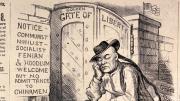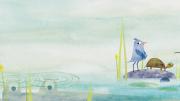“They’re very special birds, but they could go extinct in the flash of an eye,” says Gus Bodner ’89 of the native Hawaiian birds he studies. The Ph.D. candidate at the University of Hawaii at Manoa is finishing a zoology dissertation on the greatest of threats to native forest birds: the mosquito-borne diseases like avian malaria and the avian pox virus that threaten their remaining populations.
Species like the ‘i’iwi, a scarlet-colored bird whose beak evolved to reach deep into long, tubular flowers, and the ‘akiapola’au, whose slender but sturdy beak works like a Swiss-army knife, with a woodpecker-like lower bill and a slender upper bill for reaching into the crevices and cracks of tree bark looking for insects, once thrived on the Hawaiian islands, but now are seriously endangered. “Hawaii has a fascinating biota,” Bodner says, “but it is frustrating to work with something that is disappearing like sand through your fingers.”

Photographs courtesy of Gus Bodner
Gus Bodner holds a threatened ‘akiapola’au, a rare yellow and olive-green honeycreeper with an upper bill almost twice as long as its lower bill

Ten native species and subspecies have already gone extinct in the last three decades, and as global warming carries the disease-carrying mosquitoes higher and higher into the Hawaiian mountains, safe habitats for these rare birds will continue to disappear. While completing the field studies for his dissertation, Bodner would spend days high in the Hakalau Forest National Wildlife Refuge banding birds, checking them for lesions, and taking blood samples and measurements before tagging them with identification bands.
“It’s one of those places that just changes you,” Bodner says of Hakalau, the only national wildlife refuge created especially for forest birds, a forest whose name itself means “many perches.” “There are 30,000 acres of some of the best remaining Hawaiian rain forests in the world with hundreds of thousands of native birds,” he explains. Bodner was so taken by the refuge that a few years into his graduate program he helped to start a nonprofit organization, Friends of Hakalau Forest National Wildlife Refuge (www.friendsofhakalauforest.org), to support the forest and the ecosystem surrounding it.
Bodner also volunteers with local schools through a program called Kolea Watch, through which elementary-school students collect migratory data on the kolea (the Hawaiian name for the Pacific golden plover). Bodner, who taught high-school science before starting graduate school, says, “Kolea Watch is great because the students can learn science by actually doing it—they collect data every day by observing the birds on their migration and they use it to answer real scientific questions.”
Teaching field techniques to students allows him to share his passion for the Hawaiian forests with children, but one of Bodner’s other passions is his Ericson 27 sailboat—which he has called home for four years now. “I love working on the land, but living on the water is so peaceful,” he confesses. Having found his own habitat, he says he looks forward to continuing his research on Hawaiian forest birds even after finishing his doctorate.
~Casey N. Cep





